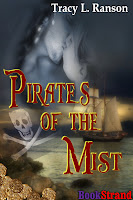
By Evangeline Holland
On the heels of the news that costume drama aficionado Keira Knightley was tapped to star in a remake of the 1965 musical, My Fair Lady, I delved back in history, past Audrey Hepburn, Julie Andrews and Wendy Hiller, to the original 'Liza Doolittle--Mrs Patrick Campbell.
 In fact, George Bernard Shaw wrote the play Pygmalion specifically for the celebrated Anglo-Italian actress, with whom he'd become involved in one of his many romantically platonic affairs. Born Beatrice Stella Tanner to a sensitive Italian mother and an adventurous English father who spent most of Stella's childhood attempting to make his fortune in America, Stella--as she was known to her family--was headstrong, passionate and willful, and determined to fight her way out of the dingy impoverishment of her childhood.
In fact, George Bernard Shaw wrote the play Pygmalion specifically for the celebrated Anglo-Italian actress, with whom he'd become involved in one of his many romantically platonic affairs. Born Beatrice Stella Tanner to a sensitive Italian mother and an adventurous English father who spent most of Stella's childhood attempting to make his fortune in America, Stella--as she was known to her family--was headstrong, passionate and willful, and determined to fight her way out of the dingy impoverishment of her childhood.
 A shot-gun marriage to the father of her eldest child, Beo, gave her a first taste of independence, though Patrick Campbell was as ill-fated and poor as her father. They produced another child, Stella, before Pat traveled to South Africa to make his fortune. In his absence, Stella began acting for both an outlet and for money, and by 1888 had become a competent enough actress to make a debut at the Adelphi Theatre in London two years later. With her dark beauty, deep-set eyes and tall, statuesque figure, Stella, who chose to act under the name "Mrs Patrick Campbell" fit the mold of the typical heroine of the "problem play," which characterized the theatre of the 1890s.
A shot-gun marriage to the father of her eldest child, Beo, gave her a first taste of independence, though Patrick Campbell was as ill-fated and poor as her father. They produced another child, Stella, before Pat traveled to South Africa to make his fortune. In his absence, Stella began acting for both an outlet and for money, and by 1888 had become a competent enough actress to make a debut at the Adelphi Theatre in London two years later. With her dark beauty, deep-set eyes and tall, statuesque figure, Stella, who chose to act under the name "Mrs Patrick Campbell" fit the mold of the typical heroine of the "problem play," which characterized the theatre of the 1890s.
 The problem play emerged during the 19th century and reached its pinnacle in the last decade of the 19th century, as seen in the witty, urbane plays of Oscar Wilde, and the penetrating realism of Henrik Ibsen. It dealt with social issues through debates between the characters on stage, who typically represent conflicting points of view within a realistic social context. Heroines of problem plays were no longer the typical shrinking violets, many of them adulterous wives, former prostitutes, and disappointed mothers. Mrs Patrick Campbell wowed audiences as Paula Tanqueray, in Pinero's The Second Mrs. Tanqueray, in 1893, and never looked back.
The problem play emerged during the 19th century and reached its pinnacle in the last decade of the 19th century, as seen in the witty, urbane plays of Oscar Wilde, and the penetrating realism of Henrik Ibsen. It dealt with social issues through debates between the characters on stage, who typically represent conflicting points of view within a realistic social context. Heroines of problem plays were no longer the typical shrinking violets, many of them adulterous wives, former prostitutes, and disappointed mothers. Mrs Patrick Campbell wowed audiences as Paula Tanqueray, in Pinero's The Second Mrs. Tanqueray, in 1893, and never looked back.
Accordingly, George Bernard Shaw, a fussy, self-educated playwright trapped in a sexless marriage, was bowled over by Stella as well. They engaged in a passionate, teasing correspondence, and Shaw was determined to write a play specifically for her. By the 1910s, Shaw was an established playwright and from this success and his infatuation with Stella, Pygmalion was born. Though written in 1912, the first English production finally opened at His Majesty's Theatre, London on April 11, 1914 and starred Mrs Campbell as Eliza and Sir Herbert Beerbohm Tree as Henry Higgins; it was directed by Shaw himself. The play was a rousing success, though Eliza's use of the word "bloody" was shocking, and could have ruined Stella's career.
 The story of Pygmalion could have ended here, as Shaw forbade any musical adaptation of his works based on his hatred of the musical adaptation of Arms and the Man (1894), entitled The Chocolate Soldier (1908). It was only after his death in 1950, that the Broadway musical My Fair Lady could be produced, which introduced not only the marvelous Julie Andrews, but gave us an iconic performance from Audrey Hepburn (and Rex Harrison), and the Ascot Gavotte musical sequence, where Cecil Beaton nearly outdid himself with the sumptuous black and white costumes.
The story of Pygmalion could have ended here, as Shaw forbade any musical adaptation of his works based on his hatred of the musical adaptation of Arms and the Man (1894), entitled The Chocolate Soldier (1908). It was only after his death in 1950, that the Broadway musical My Fair Lady could be produced, which introduced not only the marvelous Julie Andrews, but gave us an iconic performance from Audrey Hepburn (and Rex Harrison), and the Ascot Gavotte musical sequence, where Cecil Beaton nearly outdid himself with the sumptuous black and white costumes.
On the heels of the news that costume drama aficionado Keira Knightley was tapped to star in a remake of the 1965 musical, My Fair Lady, I delved back in history, past Audrey Hepburn, Julie Andrews and Wendy Hiller, to the original 'Liza Doolittle--Mrs Patrick Campbell.
 In fact, George Bernard Shaw wrote the play Pygmalion specifically for the celebrated Anglo-Italian actress, with whom he'd become involved in one of his many romantically platonic affairs. Born Beatrice Stella Tanner to a sensitive Italian mother and an adventurous English father who spent most of Stella's childhood attempting to make his fortune in America, Stella--as she was known to her family--was headstrong, passionate and willful, and determined to fight her way out of the dingy impoverishment of her childhood.
In fact, George Bernard Shaw wrote the play Pygmalion specifically for the celebrated Anglo-Italian actress, with whom he'd become involved in one of his many romantically platonic affairs. Born Beatrice Stella Tanner to a sensitive Italian mother and an adventurous English father who spent most of Stella's childhood attempting to make his fortune in America, Stella--as she was known to her family--was headstrong, passionate and willful, and determined to fight her way out of the dingy impoverishment of her childhood. A shot-gun marriage to the father of her eldest child, Beo, gave her a first taste of independence, though Patrick Campbell was as ill-fated and poor as her father. They produced another child, Stella, before Pat traveled to South Africa to make his fortune. In his absence, Stella began acting for both an outlet and for money, and by 1888 had become a competent enough actress to make a debut at the Adelphi Theatre in London two years later. With her dark beauty, deep-set eyes and tall, statuesque figure, Stella, who chose to act under the name "Mrs Patrick Campbell" fit the mold of the typical heroine of the "problem play," which characterized the theatre of the 1890s.
A shot-gun marriage to the father of her eldest child, Beo, gave her a first taste of independence, though Patrick Campbell was as ill-fated and poor as her father. They produced another child, Stella, before Pat traveled to South Africa to make his fortune. In his absence, Stella began acting for both an outlet and for money, and by 1888 had become a competent enough actress to make a debut at the Adelphi Theatre in London two years later. With her dark beauty, deep-set eyes and tall, statuesque figure, Stella, who chose to act under the name "Mrs Patrick Campbell" fit the mold of the typical heroine of the "problem play," which characterized the theatre of the 1890s. The problem play emerged during the 19th century and reached its pinnacle in the last decade of the 19th century, as seen in the witty, urbane plays of Oscar Wilde, and the penetrating realism of Henrik Ibsen. It dealt with social issues through debates between the characters on stage, who typically represent conflicting points of view within a realistic social context. Heroines of problem plays were no longer the typical shrinking violets, many of them adulterous wives, former prostitutes, and disappointed mothers. Mrs Patrick Campbell wowed audiences as Paula Tanqueray, in Pinero's The Second Mrs. Tanqueray, in 1893, and never looked back.
The problem play emerged during the 19th century and reached its pinnacle in the last decade of the 19th century, as seen in the witty, urbane plays of Oscar Wilde, and the penetrating realism of Henrik Ibsen. It dealt with social issues through debates between the characters on stage, who typically represent conflicting points of view within a realistic social context. Heroines of problem plays were no longer the typical shrinking violets, many of them adulterous wives, former prostitutes, and disappointed mothers. Mrs Patrick Campbell wowed audiences as Paula Tanqueray, in Pinero's The Second Mrs. Tanqueray, in 1893, and never looked back.Accordingly, George Bernard Shaw, a fussy, self-educated playwright trapped in a sexless marriage, was bowled over by Stella as well. They engaged in a passionate, teasing correspondence, and Shaw was determined to write a play specifically for her. By the 1910s, Shaw was an established playwright and from this success and his infatuation with Stella, Pygmalion was born. Though written in 1912, the first English production finally opened at His Majesty's Theatre, London on April 11, 1914 and starred Mrs Campbell as Eliza and Sir Herbert Beerbohm Tree as Henry Higgins; it was directed by Shaw himself. The play was a rousing success, though Eliza's use of the word "bloody" was shocking, and could have ruined Stella's career.
 The story of Pygmalion could have ended here, as Shaw forbade any musical adaptation of his works based on his hatred of the musical adaptation of Arms and the Man (1894), entitled The Chocolate Soldier (1908). It was only after his death in 1950, that the Broadway musical My Fair Lady could be produced, which introduced not only the marvelous Julie Andrews, but gave us an iconic performance from Audrey Hepburn (and Rex Harrison), and the Ascot Gavotte musical sequence, where Cecil Beaton nearly outdid himself with the sumptuous black and white costumes.
The story of Pygmalion could have ended here, as Shaw forbade any musical adaptation of his works based on his hatred of the musical adaptation of Arms and the Man (1894), entitled The Chocolate Soldier (1908). It was only after his death in 1950, that the Broadway musical My Fair Lady could be produced, which introduced not only the marvelous Julie Andrews, but gave us an iconic performance from Audrey Hepburn (and Rex Harrison), and the Ascot Gavotte musical sequence, where Cecil Beaton nearly outdid himself with the sumptuous black and white costumes.































 Granddaughter of New York City Mayor, Stephanus Van Cortlandt and daughter of Peter Kemble, a successful businessman and politician, Margaret and Thomas were wed on December 8, 1758.
Granddaughter of New York City Mayor, Stephanus Van Cortlandt and daughter of Peter Kemble, a successful businessman and politician, Margaret and Thomas were wed on December 8, 1758. 

